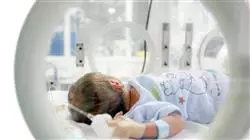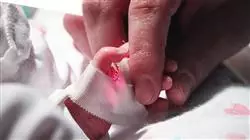University certificate
The world's largest faculty of medicine”
Introduction to the Program
A 100% online Postgraduate diploma that provides you with the latest information on the approach to neonates with hematological, renal and oncological disorders”

The survival rate of patients in Neonatology Units has achieved an important progression due to the application of certain diagnostic, monitoring, stabilization and follow-up techniques. In this sense, it is essential not only to introduce the latest advances, but also to use the most appropriate methodology.
In this sense, the medical professionals must be aware of from the most significant studies of the generalities in Hematology, through the Nephrourological pathologies to the most effective treatment in patients with Wills' Tumor. Based on the most recent information, this academic institution has developed this Postgraduate diploma in Advanced Techniques in Neonatology.
A 6-month program of 450 teaching hours of intensive updating in screening, therapeutic and follow-up procedures for newborns with Hematological, Renal, Oncological, Endocrine or Dysmorphological disorders. For this purpose, the graduates also have at their disposal video summaries of each topic, videos in detail, scientific literature and simulations of case studies.
Likewise, the Relearningsystem, consisting of the continuous reiteration of key concepts throughout the academic itinerary, will allow the students to consolidate the most important contents and reduce the long hours of study so frequent in other pedagogical methods.
A program that does not require attendance, nor does it have classes with fixed schedules, so it adapts to the real needs of medical professionals who are looking for a flexible and compatible update with their most demanding daily responsibilities. Undoubtedly an ideal academic option that only TECH, the largest digital university in the world, offers.
No attendance, no classes with fixed schedules. This university qualification is adapted to the most demanding professional responsibilities”
This Postgraduate diploma in Advanced Techniques in Neonatology contains the most complete and up-to-date scientific program on the market. The most important features include:
- The development of practical cases presented by experts in Pediatrics and Neonatology
- Graphic, schematic, and practical contents with which they are created, provide scientific and practical information on the disciplines that are essential for professional practice
- Practical exercises where self-assessment can be used to improve learning
- Its special emphasis on innovative methodologies
- Theoretical lessons, questions to the expert, debate forums on controversial topics, and individual reflection assignments
- Content that is accessible from any fixed or portable device with an Internet connection
A program designed to provide you with the most recent advances in clinical and laboratory diagnostic studies of chromosomal disorders”
The program’s teaching staff includes professionals from sector who contribute their work experience to this educational program, as well as renowned specialists from leading societies and prestigious universities.
Its multimedia content, developed with the latest educational technology, will provide the professionals with situated and contextual learning, i.e., a simulated environment that will provide an immersive education programmed to learn in real situations.
The design of this program focuses on Problem-Based Learning, by means of which the professionals must try to solve the different professional practice situations that are presented throughout the academic course. For this purpose, the students will be assisted by an innovative interactive video system created by renowned experts.
A Virtual Library accessible 24 hours a day will allow you, whenever you wish, to access the most rigorous information on Neonatology”

With this program, you will be aware of the most effective procedures used in the performance of peritoneal dialysis in the newborn"
Why study at TECH?
TECH is the world’s largest online university. With an impressive catalog of more than 14,000 university programs available in 11 languages, it is positioned as a leader in employability, with a 99% job placement rate. In addition, it relies on an enormous faculty of more than 6,000 professors of the highest international renown.

Study at the world's largest online university and guarantee your professional success. The future starts at TECH”
The world’s best online university according to FORBES
The prestigious Forbes magazine, specialized in business and finance, has highlighted TECH as “the world's best online university” This is what they have recently stated in an article in their digital edition in which they echo the success story of this institution, “thanks to the academic offer it provides, the selection of its teaching staff, and an innovative learning method aimed at educating the professionals of the future”
A revolutionary study method, a cutting-edge faculty and a practical focus: the key to TECH's success.
The most complete study plans on the university scene
TECH offers the most complete study plans on the university scene, with syllabuses that cover fundamental concepts and, at the same time, the main scientific advances in their specific scientific areas. In addition, these programs are continuously being updated to guarantee students the academic vanguard and the most in-demand professional skills. In this way, the university's qualifications provide its graduates with a significant advantage to propel their careers to success.
TECH offers the most comprehensive and intensive study plans on the current university scene.
A world-class teaching staff
TECH's teaching staff is made up of more than 6,000 professors with the highest international recognition. Professors, researchers and top executives of multinational companies, including Isaiah Covington, performance coach of the Boston Celtics; Magda Romanska, principal investigator at Harvard MetaLAB; Ignacio Wistumba, chairman of the department of translational molecular pathology at MD Anderson Cancer Center; and D.W. Pine, creative director of TIME magazine, among others.
Internationally renowned experts, specialized in different branches of Health, Technology, Communication and Business, form part of the TECH faculty.
A unique learning method
TECH is the first university to use Relearning in all its programs. It is the best online learning methodology, accredited with international teaching quality certifications, provided by prestigious educational agencies. In addition, this disruptive educational model is complemented with the “Case Method”, thereby setting up a unique online teaching strategy. Innovative teaching resources are also implemented, including detailed videos, infographics and interactive summaries.
TECH combines Relearning and the Case Method in all its university programs to guarantee excellent theoretical and practical learning, studying whenever and wherever you want.
The world's largest online university
TECH is the world’s largest online university. We are the largest educational institution, with the best and widest online educational catalog, one hundred percent online and covering the vast majority of areas of knowledge. We offer a large selection of our own degrees and accredited online undergraduate and postgraduate degrees. In total, more than 14,000 university degrees, in eleven different languages, make us the largest educational largest in the world.
TECH has the world's most extensive catalog of academic and official programs, available in more than 11 languages.
Google Premier Partner
The American technology giant has awarded TECH the Google Google Premier Partner badge. This award, which is only available to 3% of the world's companies, highlights the efficient, flexible and tailored experience that this university provides to students. The recognition as a Google Premier Partner not only accredits the maximum rigor, performance and investment in TECH's digital infrastructures, but also places this university as one of the world's leading technology companies.
Google has positioned TECH in the top 3% of the world's most important technology companies by awarding it its Google Premier Partner badge.
The official online university of the NBA
TECH is the official online university of the NBA. Thanks to our agreement with the biggest league in basketball, we offer our students exclusive university programs, as well as a wide variety of educational resources focused on the business of the league and other areas of the sports industry. Each program is made up of a uniquely designed syllabus and features exceptional guest hosts: professionals with a distinguished sports background who will offer their expertise on the most relevant topics.
TECH has been selected by the NBA, the world's top basketball league, as its official online university.
The top-rated university by its students
Students have positioned TECH as the world's top-rated university on the main review websites, with a highest rating of 4.9 out of 5, obtained from more than 1,000 reviews. These results consolidate TECH as the benchmark university institution at an international level, reflecting the excellence and positive impact of its educational model.” reflecting the excellence and positive impact of its educational model.”
TECH is the world’s top-rated university by its students.
Leaders in employability
TECH has managed to become the leading university in employability. 99% of its students obtain jobs in the academic field they have studied, within one year of completing any of the university's programs. A similar number achieve immediate career enhancement. All this thanks to a study methodology that bases its effectiveness on the acquisition of practical skills, which are absolutely necessary for professional development.
99% of TECH graduates find a job within a year of completing their studies.
Postgraduate Diploma in Advanced Techniques in Neonatology
Neonatology is a branch of medicine that focuses on the care of sick or premature newborns. In recent years, there have been significant advances in technologies and techniques for the care of newborns. In recent decades, even more advanced techniques and technologies have been developed, such as extracorporeal membrane oxygenation (ECMO), high-frequency ventilation, the use of pulmonary surfactant, and early enteral nutrition. These techniques have further improved the survival and health rates of premature and critically ill infants. At TECH Technological Uniersity we have this specialized program designed with the goal of providing skills and tools necessary to manage complex clinical situations in the neonatology setting and improve the quality of care and clinical outcomes in critically ill newborns.
These advanced techniques in neonatology are important to address the needs of sick or premature newborns and save lives. However, it is important to remember that each newborn is unique and requires an individualized treatment plan. As a Postgraduate Diploma, you will learn advanced life support techniques, such as mechanical ventilation and extracorporeal circulation. This is an excellent choice for those who wish to acquire specialized skills and develop a successful career in this field.







